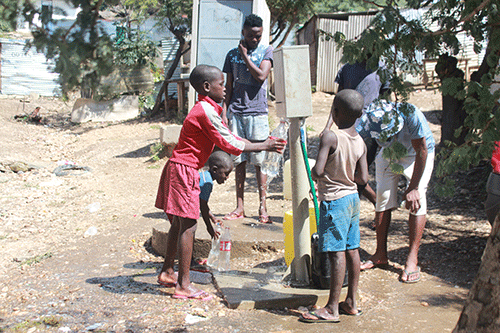KAYOVA – The Food and Agriculture Organisation (FAO) is committed to supporting Namibia in its efforts to improve water security.
FAO is currently working with government and other stakeholders to implement several climate adaptation and resilience-building projects that are supporting smallholder farmers.
This promise was shared by FAO Representative in Namibia, Qingyun Diao, during the occasion of the World Food Day 2023 commemoration last week at Kayova village in the Ndiyona constituency, Kavango East region, under the theme “Water is life, water is food. Leave no one behind”.
This day is observed annually on 16 October, but was held belatedly. This year’s theme underscores the importance of responsible water management in the face of challenges posed by population growth, urbanisation, economic development and climate change.
“To ensure that every drop counts, each one of us must adopt more efficient water consumption and management practices. We all have a role to play in effecting change. This begins with making adjustments in our personal lives, including reducing water usage, and endorsing sustainable agricultural methods. Additionally, we can actively advocate for policies that advance water security and food security for all. Together, we can forge a brighter future for everyone by striving for better production, better nutrition, a better environment, and a better life for all, leaving NO ONE behind,” Diao noted.
She also informed the community present that FAO is providing smallholder farmers with the training and resources they need to adopt water-efficient agricultural practices. They are also helping them to improve their water management skills through capacity-building training initiatives.
In its quest to promote climate-smart agriculture, FAO is working with farmers to develop and adopt climate-smart agricultural practices that can help them cope with the impacts of climate change, such as droughts and floods. These include the promotion of conservation agriculture.
Additionally, between 2018 and 2019, FAO implemented the project “Improving water access in the drought-affected regions of Namibia”, which was funded to the amount of US$200 000 by the government of Korea.
“This project was implemented by FAO in collaboration with the Ministry of Agriculture, Water and Land Reform (MAWLR), and aimed to improve water access for livestock and pastoral communities in the drought-affected regions of Erongo, Kunene and Omusati. The project managed to rehabilitate eight boreholes and four hand-dug wells across these regions as well as installed solar-powered water pumping systems,” Diao added.
Before the main World Food Day commemoration event at Kayova village, Namwater CEO Abraham Nehemia, as delegated by agriculture minister Calle Schlettwein, delivered food parcels to the family of the 16 food poison victims and two other homesteads who perished in June this year.
“As we celebrate World Food Day, we are reminded that we need to produce more food and other essential agricultural commodities with less water, while ensuring that water is distributed equally, our aquatic food systems are preserved, and nobody is left behind,” the minister stated.
Schlettwein said water has enormous and understated values to households, food production, cultural activities, the provision of health, education, economic activities and the maintenance of the natural environment.
“We, therefore, need to rededicate our efforts towards safeguarding our water resources, exploring non-conventional water sources such as water reuse, seawater desalination, and rainwater harvesting; implement water conservation and demand management measures, and promoting water use efficiency in our houses, offices, schools, irrigation schemes, industries and across all sectors,” the minister urged.
– jmuyamba@nepc.com.na


